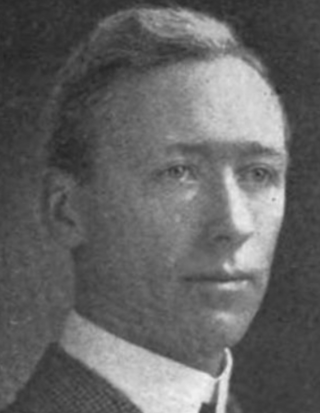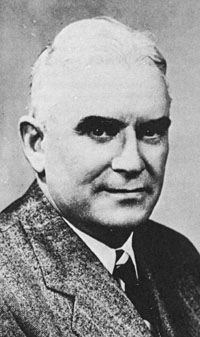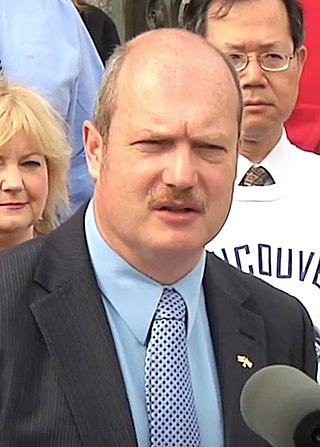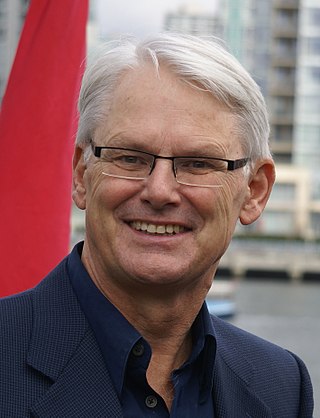BC United (BCU), known from 1903 until 2023 as the British Columbia Liberal Party or BC Liberals, is a provincial political party in British Columbia, Canada. The party has been described as conservative, neoliberal, and occupying a centre-right position on the left–right political spectrum. The party commonly describes itself as a "free enterprise coalition" and draws support from members of both the federal Liberal and Conservative parties. From the 1990s to 2024, BC United was the main centre-right opposition to the centre-left New Democratic Party (NDP). Once affiliated with the Liberal Party of Canada, the British Columbia Liberal Party became independent in 1987. The party changed its name to BC United on April 12, 2023.

John Hart was the 23rd premier of British Columbia, Canada, from December 9, 1941, to December 29, 1947.

Thomas Dufferin "Duff" Pattullo was the 22nd premier of British Columbia from 1933 to 1941.
The Conservative Party of British Columbia, commonly known as the BC Conservatives and colloquially known as the Tories, is a provincial political party in British Columbia, Canada. It is the main rival to the governing British Columbia New Democratic Party and forms the Official Opposition in the Legislative Assembly of British Columbia. It is led by John Rustad, who was originally elected as a British Columbia Liberal Party MLA in 2005 before being expelled from the Liberal caucus in 2022.

Byron Ingemar "Boss" Johnson, served as the 24th premier of British Columbia, from 1947 to 1952. To his contemporaries he was often referred to by his nickname, Boss Johnson, which had nothing to do with his personality, but was an anglicization of the Icelandic "Bjossi", which is a diminutive form of his birth-name of Bjorn, which was adapted into English as Byron.

Howard Charles Green was a Canadian federal politician.
The 1945 British Columbia general election was the 21st general election in the Province of British Columbia, Canada. It was held to elect members of the Legislative Assembly of British Columbia. The election was called on August 31, 1945, and held on October 25, 1945. The new legislature met for the first time on February 21, 1946.
The 1941 British Columbia general election was the twentieth general election in the Province of British Columbia, Canada. It was held to elect members of the Legislative Assembly of British Columbia. The election was called on September 9, 1941, and held on October 21, 1941.

Nancy Hodges was a Canadian journalist and politician. Over her career, she served as a Member of the Legislative Assembly of British Columbia, as the Speaker of the Legislative Assembly of British Columbia, and as a member of the Senate of Canada. She was the first woman in the Commonwealth of Nations to become Speaker, and was known as a powerful women's rights activist in the Commonwealth.

David Zirnhelt is a Canadian politician, businessman and rancher from British Columbia. A member of the British Columbia New Democratic Party, he was a Member of the Legislative Assembly (MLA) for Cariboo and Cariboo South from 1989 to 2001, and served in the cabinets of premiers Mike Harcourt, Glen Clark, Dan Miller and Ujjal Dosanjh.

Mike de Jong is a politician in the Canadian province of British Columbia. He was a member of the Legislative Assembly (MLA) of British Columbia, representing the electoral district of Matsqui from 1994 to 2001, Abbotsford-Mount Lehman from 2001 to 2009, and Abbotsford West from 2009 until 2024. A caucus member of BC United, he served in several cabinet posts under premiers Gordon Campbell and Christy Clark, and ran for party leadership in 2011 and 2018.
Herbert Bertie Anscomb was a Canadian politician in the province of British Columbia. He was leader of the Conservative Party of British Columbia from 1946 to 1952, and a cabinet minister in the Hart and Johnson ministries.

Royal Lethington "Pat"Maitland was a Canadian lawyer and politician. He served as Attorney General of British Columbia in the Hart ministry. He also served as national president of the Canadian Bar Association.
George Sharratt Pearson was a Canadian politician in the province of British Columbia. He represented the ridings of Nanaimo from 1928 to 1933, Alberni-Nanaimo from 1933 to 1941 and Nanaimo and the Islands from 1941 to 1952 in the Legislative Assembly of British Columbia as a Liberal.
Kenneth Cattanach MacDonald was a Canadian politician. After unsuccessfully running in the 1907 provincial election, he served in the Legislative Assembly of British Columbia from 1916 to 1924 and from 1933 to his death in 1945, as a Liberal member for the constituency of North Okanagan. He was known by his initials, "K. C." He served as the Provincial Secretary for British Columbia from September 6, 1924 until October 6, 1924.

The Campbell ministry was the combined Cabinet that governed British Columbia from June 5, 2001, to March 14, 2011. It was led by Gordon Campbell, the 34th premier of British Columbia, and consisted of members of the British Columbia Liberal Party.

The Glen Clark ministry was the combined Cabinet that governed British Columbia from February 22, 1996, to August 25, 1999. It was led by Glen Clark, the 31st premier of British Columbia, and consisted of members of the New Democratic Party (NDP).
The Vander Zalm ministry was the combined Cabinet that governed British Columbia from August 6, 1986, to April 2, 1991. It was led by Bill Vander Zalm, the 28th premier of British Columbia, and consisted of members of the Social Credit Party.
The Johnson ministry was the combined Cabinet that governed British Columbia from December 29, 1947, to August 1, 1952. It was led by Boss Johnson, the 24th premier of British Columbia, and was a coalition government that comprised members of both the Liberal Party and Progressive Conservative Party.
The Pattullo ministry was the combined Cabinet that governed British Columbia from November 15, 1933, to December 9, 1941. It was led by Duff Pattullo, the 22nd premier of British Columbia, and was composed of members of the Liberal Party.










